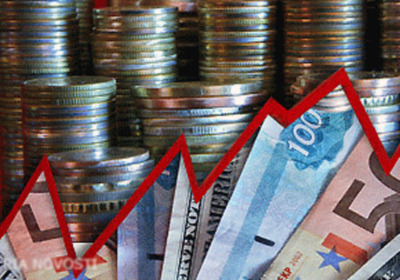Putin Debt Binge Indulged While Russia Looks Good Next to Europe

(Bloomberg – bloomberg.com – Vladimir Kuznetsov, Natasha Doff – July 20, 2016)
No one’s complaining about record debt in Russia next year as an influx of foreign investors helps the government borrow its way out of recession.
The Finance Ministry plans to quadruple domestic debt issuance to $20 billion in 2017 to fund a growing budget shortfall and avoid depleting its rainy-day fund after predicting oil will average at $40 a barrel. Even if crude languishes at those levels, the extra debt burden is manageable, according to Paul McNamara, who oversees $4.5 billion in emerging-market debt at GAM UK Ltd.
Russia has become a magnet for investors chasing high yields in emerging markets as far away as possible from a divided European Union following Britain’s vote to leave the bloc. Foreign ownership of local government bonds known as OFZs surged between May and June as external money managers pushed up their share of the market to 29 percent, or 1.26 trillion rubles ($20 billion), the most-ever, according to Societe Generale SA strategists.
“Increasing borrowing is the right thing to do,” McNamara said by phone from London. “If the money is out there and global liquidity is loose, Russia might as well pick up the flows. Emerging-market debt is back in fashion this year.”
Even after they fell to a two-year low, OFZs due in 2027 remain attractive to investors, paying 8.5 percent in a world with almost $12 trillion of sovereign debt priced with negative yields.
Still, taking out more debt threatens to lift Russia’s OFZ yields by 1 percentage point, according to Denis Poryvay, a fixed-income analyst at Raiffeisen Capital in Moscow. That burden may be wiped out by an easing cycle forecast to lower the key rate to 7.5 percent by the end of 2017 from 10.5 percent, according to economists polled by Bloomberg.
Judging from June auctions, there’s demand for more OFZs from local investors too. Local banks were the biggest buyers accounting for 77.6 billion rubles, while foreign funds took 15.2 billion rubles of a total 100 billion rubles sold, according to central bank data.
“Taking into account how much liquidity Russian banks possess right now and how big the demand can be from foreigners, I’m not fazed by it,” said Yury Tulinov, head of research at Rosbank PJSC in Moscow. “Investors, both local and global, are hunting for yield.”
Oil Quagmire
The extra borrowing may help ease a budget shortfall the government predicts at 3.2 percent of gross domestic product next year, but to erase it Russia will need a much bigger rebound in oil prices. Even after recovering from the lowest level in a decade in January, crude has traded between about $44 and $51 a barrel since early May. It was 0.5 percent higher at $46.87 per barrel at 10:19 a.m. in London.
Analysts including BNP Paribas SA and JBC Energy GmbH warned prices may decline toward $40. Russia, which based this year’s budget on the price of $50 a barrel, needs oil at $82 to balance its budget, according to ministry forecasts.
Russia slid into recession last year after crude prices lost half their value and international sanctions over Ukraine barred many of its biggest borrowers from foreign capital markets. Growth is expected to return in the first quarter of 2017, according to economists surveyed by Bloomberg.
One of its earlier responses to the oil crash at least helped Russia squeeze more earnings from hard-currency energy exports. The central bank untethered the ruble from a managed corridor in November 2014, spurring the local-currency value of its exports and giving the nation the strongest current-account balance in East Europe last year.
“The economy has adjusted fairly well to a much lower oil price,” said McNamara, who’s sticking with his positions in OFZs. “Rates are set to come down, the balance of payments looks in decent shape. It looks decent value all round.”
Article ©2016 Bloomberg L.P. All Rights Reserved. Article also appeared at bloomberg.com/news/articles/2016-07-19/putin-debt-binge-indulged-while-russia-looks-good-next-to-europe
